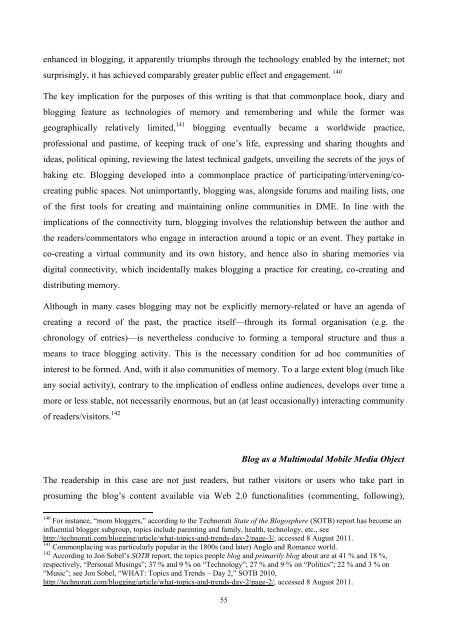UNIVERSITY OF NOVA GORICA GRADUATE SCHOOL ...
UNIVERSITY OF NOVA GORICA GRADUATE SCHOOL ...
UNIVERSITY OF NOVA GORICA GRADUATE SCHOOL ...
You also want an ePaper? Increase the reach of your titles
YUMPU automatically turns print PDFs into web optimized ePapers that Google loves.
enhanced in blogging, it apparently triumphs through the technology enabled by the internet; not<br />
surprisingly, it has achieved comparably greater public effect and engagement. 140<br />
The key implication for the purposes of this writing is that that commonplace book, diary and<br />
blogging feature as technologies of memory and remembering and while the former was<br />
geographically relatively limited, 141 blogging eventually became a worldwide practice,<br />
professional and pastime, of keeping track of one‘s life, expressing and sharing thoughts and<br />
ideas, political opining, reviewing the latest technical gadgets, unveiling the secrets of the joys of<br />
baking etc. Blogging developed into a commonplace practice of participating/intervening/cocreating<br />
public spaces. Not unimportantly, blogging was, alongside forums and mailing lists, one<br />
of the first tools for creating and maintaining online communities in DME. In line with the<br />
implications of the connectivity turn, blogging involves the relationship between the author and<br />
the readers/commentators who engage in interaction around a topic or an event. They partake in<br />
co-creating a virtual community and its own history, and hence also in sharing memories via<br />
digital connectivity, which incidentally makes blogging a practice for creating, co-creating and<br />
distributing memory.<br />
Although in many cases blogging may not be explicitly memory-related or have an agenda of<br />
creating a record of the past, the practice itself—through its formal organisation (e.g. the<br />
chronology of entries)—is nevertheless conducive to forming a temporal structure and thus a<br />
means to trace blogging activity. This is the necessary condition for ad hoc communities of<br />
interest to be formed. And, with it also communities of memory. To a large extent blog (much like<br />
any social activity), contrary to the implication of endless online audiences, develops over time a<br />
more or less stable, not necessarily enormous, but an (at least occasionally) interacting community<br />
of readers/visitors. 142<br />
Blog as a Multimodal Mobile Media Object<br />
The readership in this case are not just readers, but rather visitors or users who take part in<br />
prosuming the blog‘s content available via Web 2.0 functionalities (commenting, following),<br />
140 For instance, ―mom bloggers,‖ according to the Technorati State of the Blogosphere (SOTB) report has become an<br />
influential blogger subgroup, topics include parenting and family, health, technology, etc., see<br />
http://technorati.com/blogging/article/what-topics-and-trends-day-2/page-3/, accessed 8 August 2011.<br />
141 Commonplacing was particularly popular in the 1800s (and later) Anglo and Romance world.<br />
142 According to Jon Sobel‘s SOTB report, the topics people blog and primarily blog about are at 41 % and 18 %,<br />
respectively, ―Personal Musings‖; 37 % and 9 % on ―Technology‖; 27 % and 9 % on ―Politics‖; 22 % and 3 % on<br />
―Music‖; see Jon Sobel, ―WHAT: Topics and Trends – Day 2,‖ SOTB 2010,<br />
http://technorati.com/blogging/article/what-topics-and-trends-day-2/page-2/, accessed 8 August 2011.<br />
55

















